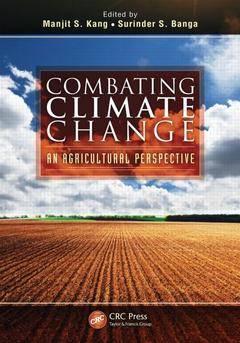Combating Climate Change An Agricultural Perspective

The effects of climate change can already be felt around the world, and they will likely impact all facets of human civilization?from health, livelihood security, agricultural production, and shelter to international trade. Since anthropogenic factors are mainly to blame for the current trends in global warming, human intervention will be necessary to mitigate it. With 17 authoritative chapters, Combating Climate Change: An Agricultural Perspective outlines a framework for preparing agriculture for climate change, presenting the causes and consequences of climate change and possible remediation measures.
With contributions from internationally recognized scientists, the chapters cover global food security, adaptation of agriculture to fulfill its greenhouse gas emissions mitigation potential, economic aspects of climate change, the soil organic carbon pool, the need for agroecological intelligence, and the development of nutrient-use-efficient crops. The text also addresses genetic mitigation of climate change effects through the development of climate-resilient crops and the use of genetic and genomic resources to develop highly productive crop cultivars, as well as the conservation of native agroecosystems.
Expert contributors discuss the impacts of climate change on plant pathogens and plant disease as well as on insects and crop losses. They address abiotic stress resistance, conservation tillage as a mitigation strategy, and more. The final chapter demonstrates the practical use of the WorldClim and DIVA software for modeling current and future climates, using Timor Leste and India as examples. Covering a broad range of issues related to climate change and agriculture, this book brings together ideas for environmentally friendly technologies and opportunities to further increase and stabilize global agricultural productivity and ensure food security in face of mounting climate challenge.
Foreword. Preface. Declining Agricultural Productivity and Global Food Security. Global Agriculture and Climate Change: A Perspective. Dynamics and Economic Aspects of Climate Change. Intensive Agriculture and the Soil Carbon Pool. Greenhouse Gas Emission from Agricultural Soils: Sources and Mitigation Potential. Agroecological Intelligence Needed to Prepare Agriculture for Climate Change. Agronomic Practices and Input-Use Efficiency. Developing Climate-Resilient Crops: A Conceptual Framework. Genomic Perspective on the Dual Threats of Imperiled Native Agroecosystems and Climate Change to World Food Security. Climate Change and the Conservation of Plant Genetic Resources. Climate Change Impact on Plant Pathogens and Plant Disease. Climate Change Effects on Insects: Implications for Crop Protection. Merging Physiological and Genetic Approaches to Improve Abiotic Stress Resistance. Abiotic Stresses and Agricultural Sustainability. Greenhouse Gas Emissions from Nontilled, Permanent Raised, and Conventional Tilled Beds in the Central Highlands of Mexico. Birth of Trinitario Cacao: History Intertwined with Myths and Edaphic and Climatic Factors. The WorldClim and DIVA Software for Modeling Current and Future Climates at a 5km Resolution: Case Studies from Timor Leste and India.
Dr. Manjit S. Kang is a plant geneticist and is currently an adjunct professor in the Department of Plant Pathology at Kansas State University, Manhattan. He received a Ph.D. from the University of Missouri, Columbia, USA. He specializes in quantitative genetics as applied to crop improvement. His expertise is globally recognized. Dr. Kang has lectured internationally on quantitative genetics as applied to crop improvement. He has edited/authored several books and has published 140 refereed journal articles in prestigious international journals, 40 book chapters/encyclopedia essays, and 135 other technical publications. He has received several prestigious honors and awards from various organizations and is a fellow of the American Society of Agronomy and Crop Science Society of America.
Dr. Surinder S. Banga
Date de parution : 04-2013
17.8x25.4 cm
Thèmes de Combating Climate Change :
Mots-clés :
Climate Change; SOC; SOC Pool; Global food security; Gt CO2 Eq; Conservation agriculture; Elevated CO2; Agricultural productivity; Frost Tolerance; Plant genetic resources; N2O Emission; Abiotic stress; Ambient CO2 Conditions; Biotic stress; Powdery Mildew; CAC; FTA; Crop Wild Relatives; Heat Stress; SOC Concentration; Genetic Resources; SOC Sequestration; Freeze Thaw Stress; Pest Management; Phoma Stem Canker; Diva Software; Freezing Stress Resistance; Freeze Thaw Injury; Crop Residue Retention



